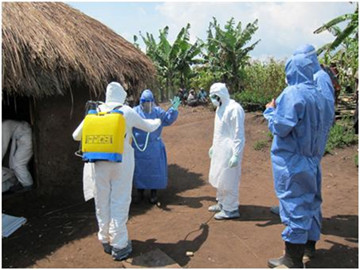
Ebola viruses are found in several African countries. Ebola was first discovered in 1976 near the Ebola River in what is now the Democratic Republic of the Congo. Since then,outbreaks of Ebola among humans have appeared sporadically in Africa. Healthcare providers caring for Ebola patients and the family and friends in close contact with Ebola patients are at the highest risk of getting sick because they may come in contact with the blood or body fluids of sick patients. People also can become sick with Ebola after coming in contact with infected wildlife. For example, in Africa, Ebola may spread as a result of handling bushmeat (wild animals hunted for food) and contact with infected bats. The virus also can bespread through contact with objects (like clothes, bedding, needles,syringes/sharps or medical equipment) that have been contaminated with thevirus or with infected animals. With Ebola protocols developing almost daily in the public health sector, the American Water Works Association will offer a timely webinar focusing on risks and precautions for drinking water and wastewater employees. The webinar, titled Preparing for Ebola in the Water Sector, will be at 1–2 EST on Nov. 6.
|